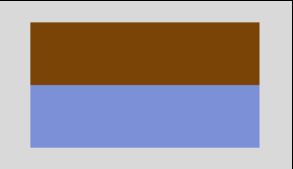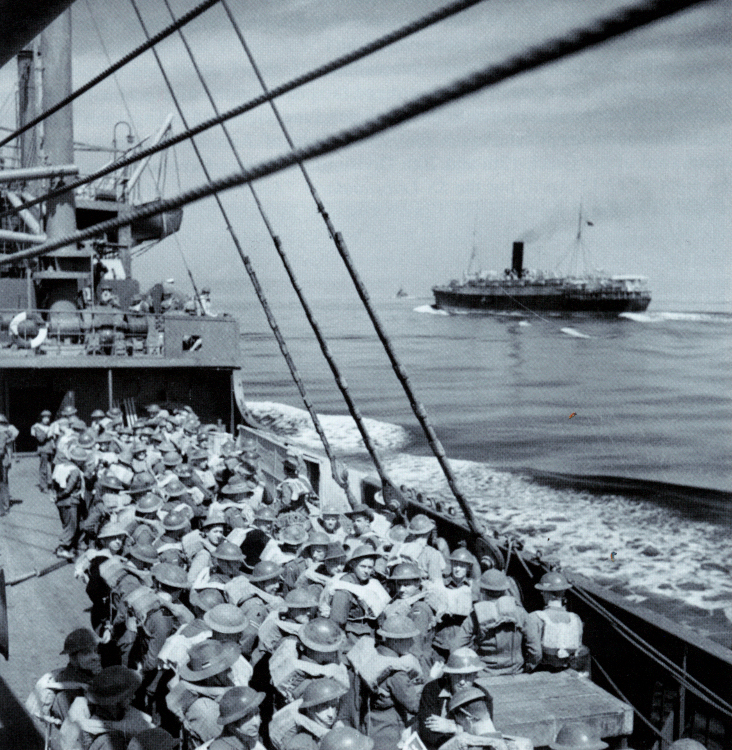Difference between revisions of "2/11th Australian Infantry Battalion"
From Our Contribution
(→Brief History) |
(→Battalion Personnel) |
||
| Line 55: | Line 55: | ||
* [[Douglas Windsor Parkin]] 11 Nov 1939 - ?? | * [[Douglas Windsor Parkin]] 11 Nov 1939 - ?? | ||
* † [[Mervyn Roy Parkin]] ?? Mar 1940 - KIA 19 Apr 1941 | * † [[Mervyn Roy Parkin]] ?? Mar 1940 - KIA 19 Apr 1941 | ||
| − | * [[Charles Amos George Victor Petersen]] 9 Nov 1939 - | + | * [[Charles Amos George Victor Petersen]] 9 Nov 1939 - 6 Jun 1941 - POW 6 Jun 41 - 28 May 1945 |
* [[James Percy Ray]] 8 Nov 1939 - Aug 1945 - WIA & POW Crete | * [[James Percy Ray]] 8 Nov 1939 - Aug 1945 - WIA & POW Crete | ||
* [[Thomas Timothy Roberts]] | * [[Thomas Timothy Roberts]] | ||
Revision as of 23:37, 9 August 2022
 Unit Colour Patch | |
 Aboard SS Pennland from Alexandria to Greece AWM Photo 006779 | |
Contents
Brief History
The first Western Australian battalion raised for service overseas during the Second World War. Its formation began on 13 Oct 1939 and by 7 November it was assembling at the newly-built Northam Camp to begin training. On 30 Nov 1939 it left Northam to join the 18th Brigade of the 6th Australian Division at Greta in New South Wales. The battalion returned to Western Australia in the middle of March 1940 and embarked at Fremantle for service overseas on 20 Apr 1940.
They arrived in the Middle East on 18 May 1940, and the 2/11th trained in Palestine and Egypt. A decision to reorganise Australian infantry brigades along British lines, with three battalions instead of four, resulted in the 2/11th becoming part of the 19th Brigade, but it remained as part of the 6th Division. The battalion saw action for the first time at Bardia on 5 Jan 1941. As part of the Allied advance into Italian-occupied Libya, they fought at Tobruk on 21-22 Jan 1941, and they secured Derna airfield on 25 Jan 1941. The battalion was advancing to the south of Benghazi when the Italians surrendered on 7th February.
In early April 1941 the 2/11th were deployed from Alexandria on 10th April to assist in the defence of Greece from the invading German forces who had come to retrieve the situation from their Italian allies. Arriving at Athens on 12th April aboard SS Pennland, they moved to Larissa where they were to hold the line. However, by the 18th, the Allied forces were unable to hold the Germans back, and the 2/11th withdrew from its initial positions west of Kalabaka and remained on the move until it occupied rearguard positions at Brallos Pass a week later. It fought a fighting retreat through the pass, slowing the Germans there on 24 April before continuing its withdrawal to Megara on the coast. From here it was evacuated by SS Thurland Castle on the night of 25 Apr 1941, landing at Suda on Crete the following day, where it was deployed with the 2/1st Battalion to defend Retimo airfield. They then fought tenaciously for ten days following the landing of German paratroops on 20 May. German successes elsewhere on Crete, however, made surrender inevitable. Many 2/11th soldiers attempted to escape from Crete but only a relatively small number ultimately succeeded. Most were taken prisoner.
The battalion was rebuilt in Palestine based on those who had escaped Greece and crete. By mid-September 1941 they had moved to Syria where they undertook garrison duties until late Jan 1942. The battalion left the Middle East on 16 Feb 1942 and arrived at Adelaide on 16 March. In April it was attached to the 2nd Brigade of the 4th Division, then charged with assisting the defence of Western Australia. Fifteen months later, in July 1943 they rejoined the 19th Brigade in northern Queensland. Another 18 months would pass before it saw action again.
The 2/11th landed at Aitape in New Guinea on 13 Nov 1944 to undertake its only campaign against the Japanese. Patrolling, often arduous in nature, constituted the bulk of its operations. Its main areas of operation were east of the Danmap River (January 1945), and in the foothills of the Prince Alexander Range to the south of Wewak (April-July 1945). Following the Japanese surrender on 15 August, drafts of 2/11th men began returning to Australia for discharge. The remainder of the battalion departed Wewak on 10 Nov 1945, and disbanded at Puckapunyal on 7 Dec 1945.
Battalion Personnel
- Walter Leonard Axford 17 Jun 1940 - 22 Jul 1940 & 4 Jun 1944 - 29 Mar 1945
- Geoffrey Gordon Benson 4 Nov 1939 - 8 Jun 1941
- Harry Wallace Benson 7 Nov 1939 - Aug 1945 - POW Greece/Crete
- Oliver Donald George Bruce
- Alan Clifton Navin Butcher
- William George Davis 13 Nov 1941 - 7 Nov 1945
- Mervyn Eric Doherty 12 Dec 1942 - 15 Jul 1943
- Edward Charles (Ted) Fancote 4 Dec 1939 - Aug 1945 - POW Crete
- Robert Henry Fletcher 6 - 28 Sep 1941
- William Randall Foggon 23 Nov 1939 - Aug 1945 - POW Greece
- George Garratt - 8 Nov 1939 - Aug 1945 - POW Crete
- Stanley Hubert Hancock 8 Nov 1939 - Aug 1945 - POW Crete
- † Robert Hassett 29 Mar 1941 - 11 Jun 1942 - POW Crete
- Donald Campell William Henderson 11 Dec 1939 - Aug 1945 - POW
- Francis (George) Hicks MM 5 Jul 1944 - 22 Jan 1944
- Arthur Gordon Hubbard 19 Sep 1944 - 6 Nov 1945
- Andrew David Johnson ??? - Aug 1945 - POW
- William James Johnson 3 Apr 1940 - Aug 1945 - POW Crete
- Cornielius Harold (Con) Kerrison 9 Nov 1939 - 28 Jul 1945
- † Kenneth Myers Kroenert Nov 1939 - 15 Nov 1941 POW Crete - died of illness
- Thomas Malarkey 13 Nov 1941 - 16 Aug 1945
- Frederick Tomas Orton Miller
- Arthur Mitchell 18 Dec 1939 - 7 Oct 1944
- Maurice Gerard O'Brien 9 Apr 1940 - 30 May 1941 WIA 20 May 1941 - POW Crete from 30 May 1941
- Douglas Windsor Parkin 11 Nov 1939 - ??
- † Mervyn Roy Parkin ?? Mar 1940 - KIA 19 Apr 1941
- Charles Amos George Victor Petersen 9 Nov 1939 - 6 Jun 1941 - POW 6 Jun 41 - 28 May 1945
- James Percy Ray 8 Nov 1939 - Aug 1945 - WIA & POW Crete
- Thomas Timothy Roberts
- † Robert Summerfield 15 Nov 1939 - 20 May 1941 - KIA Crete
- Walter Roland Williams
Battle Honours
- Abau-Malin
- Bardia 1941
- Brallos Pass
- Capture of Tobruk
- Derna
- Matapau
- Retimo
- Wewak
- Wirui Mission
Campaign Honours
- Crete
- Greece 1941
- Liberation of Australian New Guinea
- Middle East 1941-1944
- North Africa
- South-West Pacific 1942-1945
Individual Honours
- 2 x Distinguished Service Orders
- 1 x Officer of the British Empire
- 3 x Members of the British Empire
- 6 x Military Crosses
- 4 Distinguished Conduct Medals
- 20 Military Medals
- 66 Mentioned in Despatches
Notes
Content has come from a combination of Wikipedia and the Australian War Memorial websites.